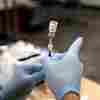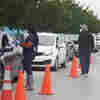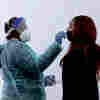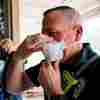People wait in line to receive a COVID-19 test on Tuesday in New York. The U.S. recorded more than 1 million COVID-19 cases on Monday.
Angela Weiss/AFP via Getty Images
hide caption
toggle caption
Angela Weiss/AFP via Getty Images
People wait in line to receive a COVID-19 test on Tuesday in New York. The U.S. recorded more than 1 million COVID-19 cases on Monday.
Angela Weiss/AFP via Getty Images
Things might seem pretty grim on the pandemic front right now. The U.S. is only a few days into the third calendar year of the pandemic and nearly 500,000 new COVID-19 cases are being counted daily.
The country hit another record high on Monday with 1,082,549 infections. So if it's hard to find a glimmer of hope, you're not alone. But Dr. Bob Wachter has a bit of hope to share.
Wachter chairs the Department of Medicine at the University of California, San Francisco, and took to Twitter last week to share his thoughts and predictions on how the country "could be in good shape, maybe even great shape in six to eight weeks."
He joined NPR's All Things Considered to talk about the current case rates and hospitalization rates and how they might trend, the new antiviral COVID-19 pills and what the omicron variant will likely mean for the unvaccinated population.
This interview has been edited for length and clarity.
Interview highlights
Could the U.S. really be in "good shape" in terms of the pandemic in six to eight weeks?
Yeah, I think that's the likeliest outcome. I should always caveat it by the fact that over the past two years, every time things have started looking good, something bad happens. So it's possible that will happen again. There'll be another variant that will be a curveball. But if that doesn't happen, I think the likeliest outcome for February and March is that we'll be in pretty good shape.
This virus being so transmissible but now, as we understand it, being milder than the prior variants could turn out to be very good news after a very awful January.
What are you seeing in terms of case rates and hospitalization rates, and what might you hope to see there in the coming weeks?
What's happening now is the cases are exploding, as we've never seen before, and that really is a manifestation of how extraordinarily infectious omicron is. What we're not seeing is the same relationship between cases and hospitalizations. So the average case of omicron has about a 60% lower chance of landing you in the hospital than the average case of delta.
Now you might hear that and say that doesn't make sense. Why are the hospitals filling up? And the reason is, even if the average case is less likely to land you in the hospital, if there are twice or three or five times as many cases, then you will have more people laying in the hospital. So the short-term risk — and we're seeing it all over the country — is the hospitals will get filled with patients with omicron.
A fair number of doctors and nurses will be out sick with omicron. And so we have a pretty miserable month, even though the average patient has a lower chance of ending up in the hospital than he or she would have had if they had a case of delta, particularly if they're vaccinated.
But very importantly, for the people that chose not to be vaccinated — I think a very terrible choice, but who made that choice — there's a pretty good chance they're going to get a case of omicron, which will give them some immunity. And it's those two things combined — the fact that the average case is going to be milder, and more and more people are going to be immune to this virus — that gets us out of this pickle, I think, in February.
Antiviral COVID-19 pills are being rolled out. They're in small quantities so far, but what effect could these have in the coming weeks?
Yeah, it's an important new part of our armamentarium. Up till now, we've really just had monoclonal antibodies to give to people at very high risk who got COVID but were not sick enough yet to be in the hospital. But two new pills have come out. The Pfizer is a much bigger deal than the Merck. The Merck lowers the probability that someone who gets a case of omicron will land in the hospital by 30%, the Pfizer by 90%.
So, it's in short supply. The supply is growing. Within a month or two, there will be a decent supply. So that is another very important tool that we'll have.
You're the chair of medicine at a big hospital there in San Francisco. Can your high-risk patients get these COVID pills?
[They're] just starting to be available. We have them in some of our pharmacies, but we're having to triage them quite severely and be very selective about who gets them, but I think they'll become more and more available over time. It's a pretty tricky chemical compound to produce. So it is taking the company some time to produce them, but the supply should grow steadily over the next couple of months.
How are things looking for the unvaccinated? Where do you see their risks going in the next weeks and months?
If you are unvaccinated and you're not being super careful, by which I mean wearing an N95 mask all the time if you're going indoors, it's almost hard to believe that you will not get this virus.
The problem is, people who are unvaccinated are hearing that the average case of omicron is milder. It is milder, but it's particularly milder for people that are vaccinated. For the people that are unvaccinated, the best estimates from the science so far are that maybe it's about 25% less likely to land you in the hospital, and you might say, "That's OK, good, it's milder." But if it's 25% less likely to land you in the hospital and you have a five times greater chance of becoming infected in the next month, that math doesn't land you in a good place.
That means that there are going to be more and more unvaccinated people who get omicron. A lot of them will end up in hospitals. A lot of them unfortunately will end up in ICUs, and a fair number of them will be the ones who die over the next four to six weeks as this hurricane sort of rampages through our country.
People are also hearing that the vaccines and boosters aren't worth it. They don't work because everybody we know is getting sick anyway. What do you say about this?
Yeah, I can understand how people would feel that, but that's just not right. The vaccines and boosters are miraculous, and they are miraculous because what they do is markedly lower the probability that you will get very sick, go to the hospital, go to the ICU, end up on a ventilator and die.
There's no question that there are more breakthrough cases. This virus is very good at sidestepping some of your immunity, but the kind of case that you're going to have if you've had particularly three shots is so much more likely to be a mild case of a couple of days of cold or flu symptoms than it would be for the unvaccinated person. Those are the ones who are landing in the hospital, landing in the ICU, and ultimately, the deaths that we will have from omicron will be almost entirely in unvaccinated people.
Is there anything that could throw this prediction of hope off?
Sure. Two big questions going forward in terms of how rosy the future might be. One is, how good is the immunity that a case of omicron gives you against another case of either omicron or another variant? I'm sure it'll be fine for a while. But does it last for three months or a year? That will make a difference in terms of whether the risk goes up, let's say, next winter.
And the second, of course, is this great unknown, which is, will there be another variant? And anybody who tells you they can predict that is making it up because nobody I know predicted delta. Nobody I know predicted omicron. And all that means is there could be something even nastier than omicron on the horizon. And that will change the projections. But for now, I think things look pretty good.






















































































